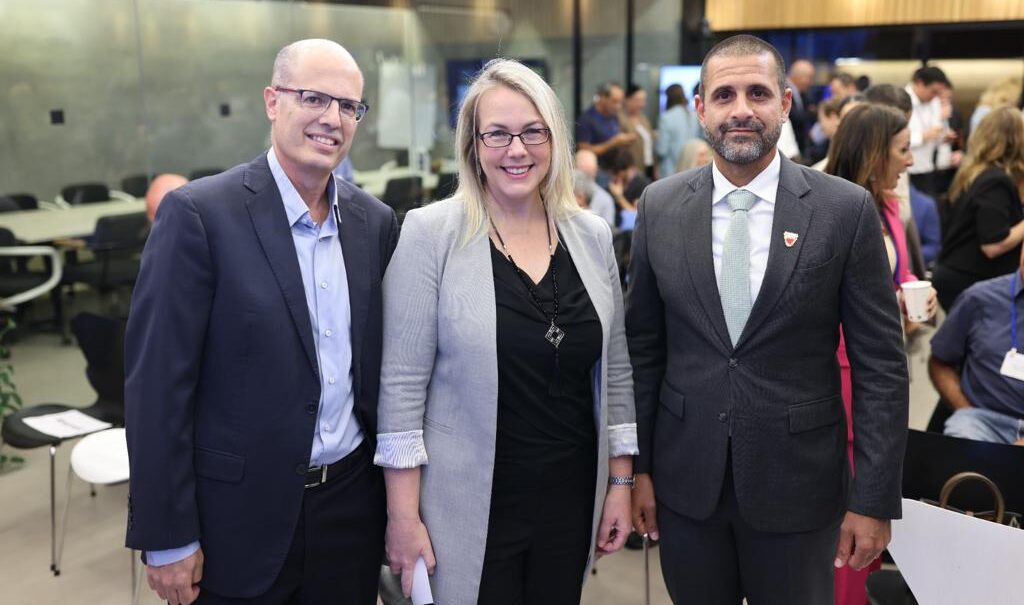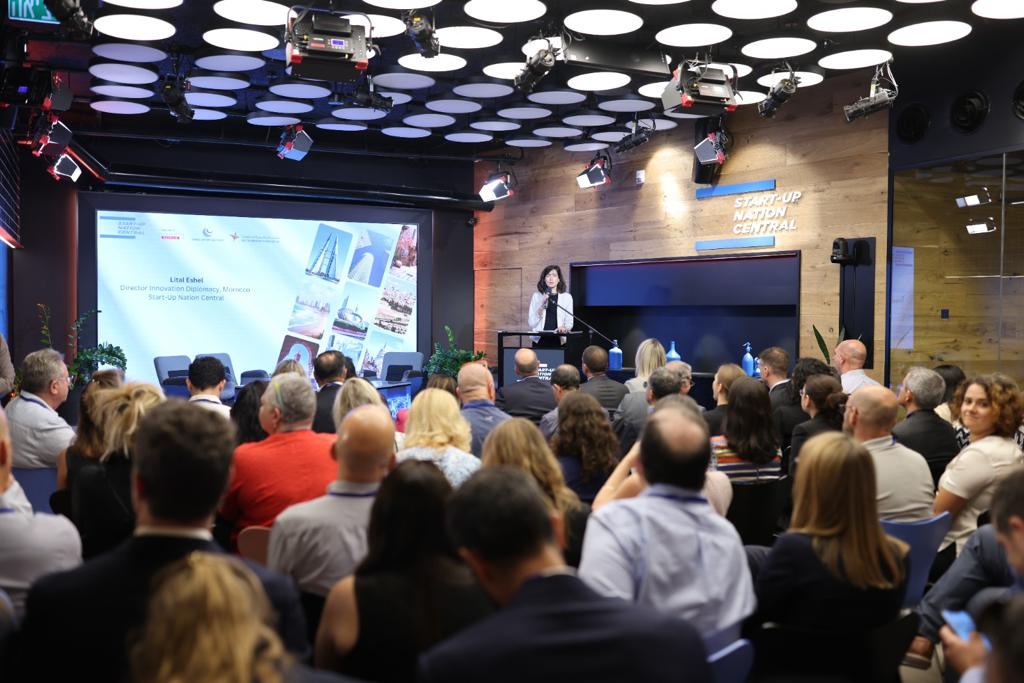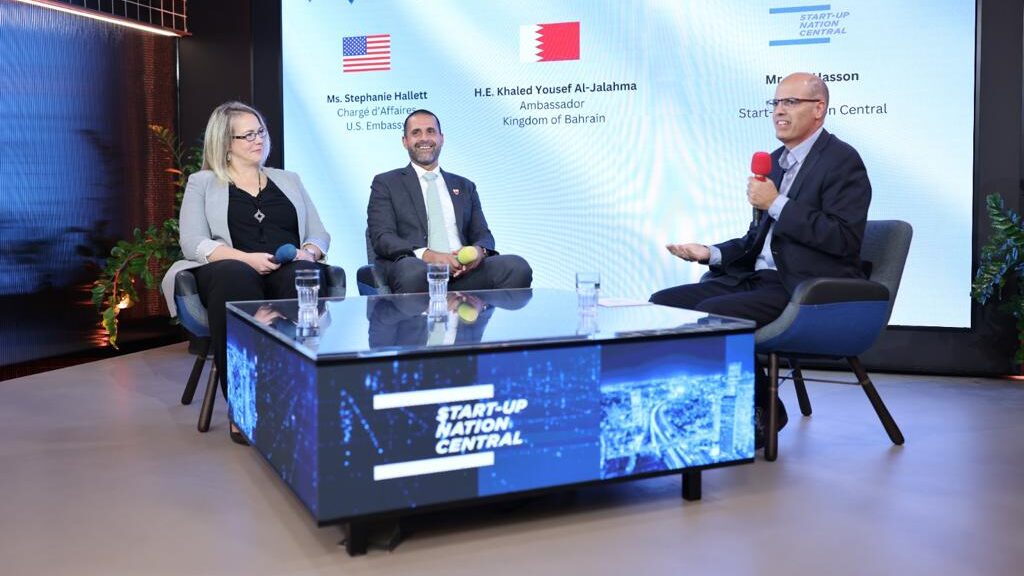Business Ties Soar Despite Political Bumps as Abraham Accords Near 3rd Anniversary
Peer-to-peer business is thriving as deals continue to be signed and hundreds of companies get on the bandwagon of ties between Israel and the signatories of the normalization agreements
It was once considered taboo to have Israelis and Arabs from Middle Eastern nations collaborating on core issues that impact people’s lives.
Marking the third anniversary of the Abraham Accords recently brought together the Bahraini ambassador to Israel, Khalid Yusuf Ahmed Aljalahma, the US Embassy in Jerusalem’s Chargé d’Affaires ad interim, Stephanie L. Hallett, and Avi Hasson, CEO of Israel’s Start-Up Nation Central, who described the Abraham Accords as “the biggest opportunity of our lifetime,” in an event at which they shared insights into the accords’ successes and obstacles.

(L-R) Avi Hasson, CEO of Start-Up Nation Central, Stephanie L. Hallett, chargé d’affaires ad interim at the US Embassy in Jerusalem; and Bahraini Ambassador to Israel Khalid Yusuf Ahmed Aljalahma, at the event in Tel Aviv, Israel, Sept. 7, 2023. (Courtesy Start-Up Nation Central)
Aljalahma addressed a packed room at Start-Up Nation Central’s event in Tel Aviv and emphasized the key to the success of the normalization between Bahrain and Israel.
“It’s always about looking at the areas that we both find important, areas where we have a joint interest, and that is where we will find success,” he said.
Aljalahma highlighted a core joint project in the medical field.
“The first collaboration we had was with Sheba Hospital [Israel’s largest hospital],” he said. “Recently we have been looking at Sheba’s innovation center, and Sheba has been very willing to assist us in creating our own very first innovation center in Bahrain.”
Peer-to-peer collaborations are the backbone of the Abraham Accords, both Aljalahma and Hallett agreed.
“The best collaboration is not government-to-government, but it is led by the private sector and the people,” Hallett said.
The groundbreaking Abraham Accords were signed on the White House lawn on Sept. 15, 2020, between Israel, the United Arab Emirates, and Bahrain, followed on Dec. 10 by normalization between Israel and Morocco, paving the way for a business ecosystem.

Event participants watch the Sept. 15, 2020 Abraham Accords signing ceremony, Tel Aviv, Israel, Sept. 7, 2023. (Courtesy Start-Up Nation Central)
“Focusing on specific projects, especially in innovation and R&D, is the way to go. The more you have concrete projects, concrete programs with concrete successes that people can look toward … the more you get through those barriers,” Hallett said.
“The United States is not only a party to the Abraham Accords but is really invested in its success long-term, and while three years is an incredible milestone, it is just the beginning,” she said.
Business Cooperation and Innovation Needed to Safeguard the Accords
Since the signing of the Abraham Accords, there have been highs and lows in the political relationship between Israel and the Arab countries. In the aftermath of the signing, there were many official meetings and exchanges of delegations, even as Prime Minister Benyamin Netanyahu was replaced by Naftali Bennett and then by Yair Lapid.
However, since Netanyahu regained office late last year at the head of a right-wing coalition, diplomatic exchanges on the political level have decreased and appear to be teetering.
The second Negev Forum, a summit that brings Israel and its Arab allies together to focus on the development of regional projects, was delayed by host nation Morocco because of Israeli settlement announcements, Israeli Foreign Minister Eli Cohen said in June.
The first Negev Forum, held in March 2022 in Israel’s Negev Desert, brought together Israel, the United States, the UAE, Bahrain, Morocco, and Egypt, with which Israel has had a peace treaty since 1979. The summit’s aim was to strengthen ties between Israel, Egypt, and the three Abraham Accords countries.
Many entrepreneurs there were tasting the success of the developing business ties of the normalization agreements.
“We heard just now in the panel about some success stories that, besides just generating revenues for the respective providers, also made an impact on those communities, the water security or food security, and sometimes its energy availability,” said Hasson, who until 2017 was the Economy Ministry’s chief scientist.
Asked by The Media Line if the political obstacles have impacted the developing business relationships, Hasson was quick to say this was not the case and illustrated the point by speaking of Israel’s long trade record with Turkey, despite recurring political hiatuses.
“Israel has [had], in the past 60 years already, I would say, a lot of ups and downs in our relationship with Turkey. … By looking at Israel’s trade numbers with Turkey, you will see that even in tough times, Turkish leaders were very staid and very negative, but the business community continues to trade,” Hasson said.
That might not sound like a lot of money, but that makes the UAE a top trading partner with Israel
In the case of the Abraham Accords countries, Hasson said that trade numbers have been constantly rising, and that trade with the UAE, the largest economy of the Abraham Accords countries, exceeded $2.5 billion in bilateral trade.
“That might not sound like a lot of money, but that makes the UAE a top trading partner with Israel,” he said.
Trade between Israel and the UAE reached $298 million in May 2023, a 48% increase from May 2022. Total trade between Israel and the UAE in 2022 was $2.9 billion, according to Israel’s Central Bureau of Statistics.
Trade between Israel and Bahrain reached $12.7 million in 2022.
Morocco’s trade with Israel reached $55.7 million in 2022. Trade between the countries for the first five months of 2023 was $33.4 million, constituting a 110% increase in trade from the first five months of 2022, the bureau said.
This holiday season, give to:
Truth and understanding
The Media Line's intrepid correspondents are in Israel, Gaza, Lebanon, Syria and Pakistan providing first-person reporting.
They all said they cover it.
We see it.
We report with just one agenda: the truth.



Lital Eshel, innovation diplomacy director at Start Up Nation Central, speaks at the event in Tel Aviv, Israel, Sept. 7, 2023. (Courtesy Start-Up Nation Central)
Even with the political ups and downs, the trade trend continues to look promising.
“I will say again, very openly, this is not necessarily the best of times in terms of the political relationship between the Israeli government and other governments, and yet at Start-Up Nation Central, we are welcomed very warmly by all of these countries with all of our activities,” Hasson said.
He said that his organization is very active in several countries with which Israel does not have diplomatic relations, and noted that they are all interested in what Israel can offer to solve their key problems.
Water and food security, health-related matters, and cyber threats are some of the key issues serving as common ground for cooperation between Israel and the Arab nations with which business ties are advancing.
“We [in the Middle East] don’t have enough water. The gap between supply and demand is growing. That’s worldwide, but it’s even more so in our region,” Amir Peleg, founder and CEO of Takadu, an Israeli water solutions company, told The Media Line.
Peleg said that Israel has long suffered from a water shortage and has developed solutions to counter it. However, he said there are many nations in the region that have not yet figured out a way to combat water scarcity.
“Together with investments, together with people, together with governments, we could create collaborations. It’s not just about, ‘Let’s take the Israeli-ready technology and operate it,’” he said.
Looking ahead, Peleg told The Media Line about a joint project being developed between Israel and Bahrain.
“We are now starting a pilot project with the Bahraini Water and Energy Authority to implement and deploy the technology so that eventually it will save them a lot of water and will bring them greater visibility of the issues they have in their own water network, so they can take precautions, actions, and save water, save energy, and improve their service,” he said.
It is no secret that some of Israel’s governmental agencies and private business sector companies have been operating discreetly in countries that do not have diplomatic relations with Israel.
Sharon Dvir, a co-founder and general partner at the Rimonim Agro venture capital fund, said that even before normalization, large Israeli companies such as Mekorot, Israel’s national water company, were doing business in the Persian Gulf, and that what the accords did was to pave the way for small companies to penetrate the market.
“We visited the UAE before the Abraham Accords, but we couldn’t get on board because only very large companies like Mekorot and Netafim used to work there,” Dvir said. “As a small startup venture capital [fund], [we] could not operate there.”
Dvir said that once the accords opened the door, his company received exposure at Dubai’s Expo for the first time.
This then served as a bridge to Egypt, with which, despite the 1979 peace agreement with Israel, no major business opportunities had developed.
“The UAE for us is the gateway to Egypt. Although Israel is at peace with Egypt, it’s easier for us to approach through the UAE,” Dvir said.
Triumphs and Challenges
Following the success of Start-Up Nation’s Central’s Connect to Innovate conference in March this year, which brought 600 Israeli and Bahraini companies to Manama, an announcement was made that there would be another conference in 2024, and the whole Middle East would be welcome to participate.
“We are expecting to triple or quadruple the size,” Aljalahma said.
Over the past three years, significant memorandums of understanding (MoUs), agreements, and cooperation deals have been signed by the governments of the Abraham Accords countries, improving collaborations in trade and defense, among other fields.
In March this year, Israel and the UAE signed a Comprehensive Economic Partnership Agreement, which exempts 96% of the traded products from customs duties.
In November 2021, Israel and Morocco signed their first defense MoU, which established a robust framework formalizing defense relationships among the nations and laying the groundwork for future collaborations.
Partnerships have successfully transcended the business community and civil society as well. Jerusalem Deputy Mayor Fleur Hassan-Nahoum, a co-founder of the UAE-Israel Business Council and Gulf-Israel Women’s Forum, told The Media Line how this is reflected in both the organizations she created.
The UAE-Israel Business Council was established in the context of the Abraham Accords to foster shared opportunities, economic cooperation, and business partnerships between Emiratis and Israelis.
The foreign minister of Bahrain witnessed an MoU between Trucknet and a Bahraini logistics company. They were in our logistics webinar a year and a half ago, talking about the potential of the Gulf.
Hassan-Nahoum said that as part of its activities, the council arranged a series of virtual and physical meetups for people from both countries involved in specific fields. One involved Trucknet, an Israeli transport optimization platform.
“The foreign minister of Bahrain witnessed an MoU between Trucknet and a Bahraini logistics company. They were in our logistics webinar a year and a half ago, talking about the potential of the Gulf,” she said.
The Gulf-Israel Women’s Forum is less about business and more general, Hassan-Nahoum said.
“The philosophy is all about peer-to-peer,” she said. “We can get involved in the things that are in our common interests, whether it’s business, whether it’s culture, whether it’s music, whether it’s sports, whether it’s journalism, and we can be good conveners to bring those women together.”
Despite the flourishing business joint ecosystem and developing civil society relations, there are still some challenges to overcome.
I think there’s a genuine sense of the issue of security on the Emirati and Bahraini side of coming to Israel, people do not necessarily feel safe, and I think we need to change that perception
“I doubt if there is an Israeli who hasn’t been to Dubai or Abu Dhabi,” Hasson said. However, he pointed out that tourism has been largely one-way, with Israelis traveling to Gulf countries but few Emiratis or Bahrainis making their way to Israel.
“I think there’s a genuine sense of the issue of security on the Emirati and Bahraini side of coming to Israel, people do not necessarily feel safe, and I think we need to change that perception,” he said.
Hasson said his organization is attempting to address that misperception by coordinating arranged visits of delegations.
“They come here [and] they’re amazed. They didn’t expect to see what they were seeing. They didn’t expect to see the level of development. They didn’t expect to feel as safe as they did while walking about in Tel Aviv. They didn’t expect to be as welcomed. That needs to be multiplied,” he said.
However, Hassan-Nahoum said the main problem lies at the Israeli airport.
“We still haven’t figured out how to receive and how to bring in Arab Muslim tourists. And until we sort that out, we’re not going to be able to really consider serious tourism from the Gulf,” she said.
She said that in the current technological age, Israel should be able to figure out how to filter out troublemakers and remove the barriers for others.
“We have to do better,” she said.
Aljalahma counseled patience.
“Just because it is slow, it does not mean that it is not good. Sometimes doing it slowly, with some ‘savlanut’ [‘patience’ in Hebrew], really is the right way forward,” he said.
What the Future Holds: Is Saudi Arabia Next?
Hallett spoke of the current buzz about a normalization agreement with Saudi Arabia.
“It is no secret that the US is working with Israel to expand the Abraham Accords, Saudi Arabia being the preeminent target for that. And it’s clear that it is in Saudi Arabia’s interest,” she said.
Hallett added that for Saudi Arabia, there is no country more natural than Israel with which to cooperate to achieve the goals of Crown Prince Mohammed bin Salman’s Vision 2030.
Business often paves the way for official normalization agreements, and there are currently several Israeli projects in Saudi Arabia.
Dvir told The Media Line that his company already has a project in the kingdom “that I cannot disclose.” He also said he had been invited by a Saudi university to be one of their advisers.
The cooperation goes beyond Saudi Arabia and even reaches countries that have criminalized normalization with Israel.
“It’s not a secret that Israel works with all the Arab countries,” Dvir said. He said one example was one of his portfolio companies, seed development company Salidcrops, which had reached as far as Iraq.
“One of our companies, Salidcrops, is working to treat wheat seeds in order to help them cope with hit and drought. One of the countries that has suffered a lot from the heat now is Iraq. We have sent it to Iraq through a third party, which is a great success,” he said.
Asked if Israel had reached deals under the radar with other Arab countries such as Oman, Hasson replied, “I’ll answer by saying that there were business deals signed in all the Abraham Accords countries before the agreements were signed. And from that, you can deduce everything and anything you want.”

